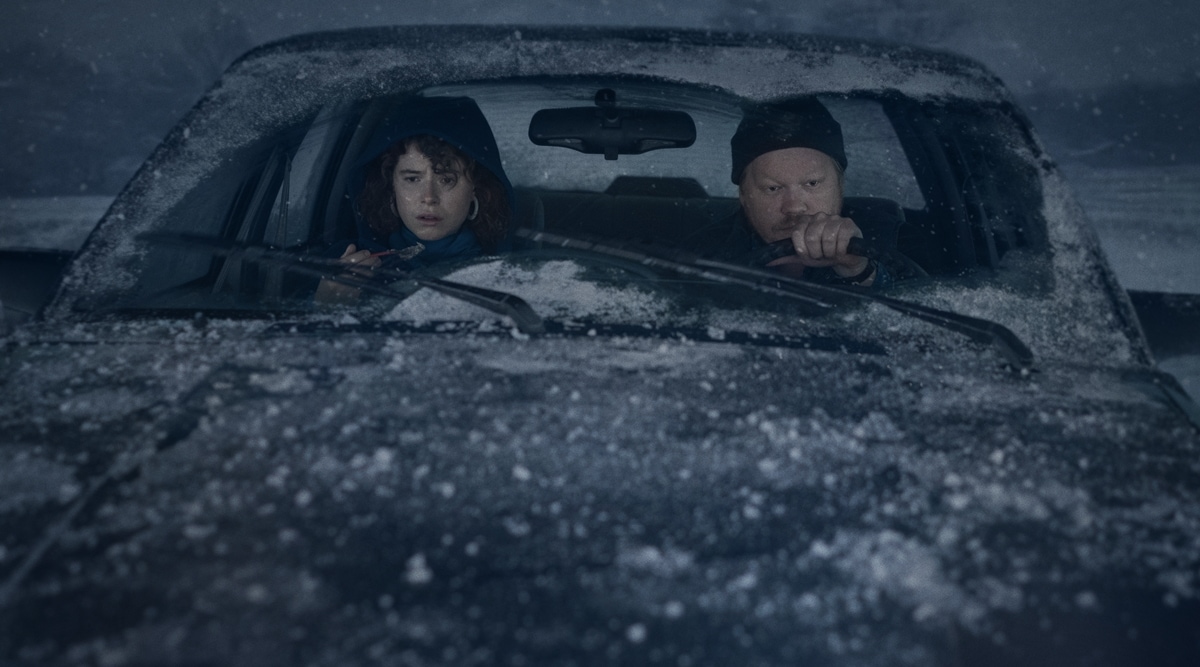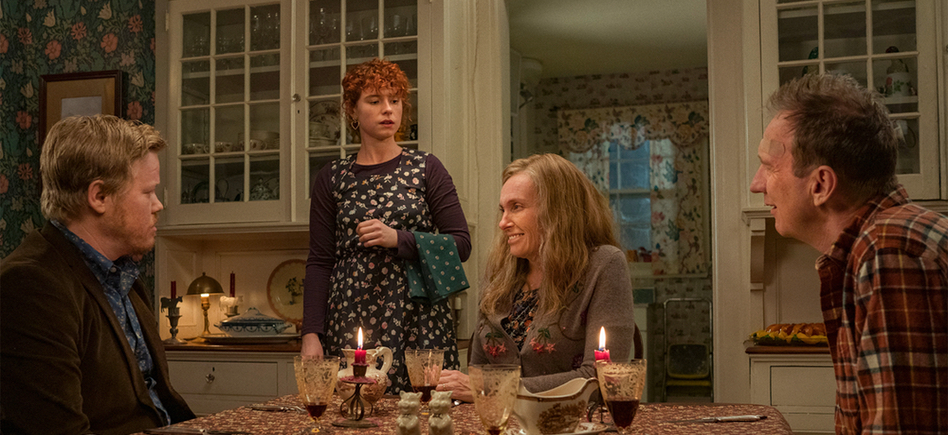I write this review in the total knowledge that I have
enjoyed every single Charlie Kaufman film I’ve ever seen abundantly more on a second
and third watch, and many times after those times. With the exceptions of Being John Malkovich, Eternal Sunshine of
the Spotless Mind and Adaptation,
all works where Kaufman’s scripts were brought to the screen by directors other
than himself (for example by Spike Jonze and Michel Gondry), it has taken multiple watches for
me to actually declare them as films that I enjoy. Each virgin viewing of
the films was met with an abundance of moments where I was overwhelmed with the
immense quality of what I was watching, but surrounding those moments were lengthy
stretches where I was genuinely considering whether or not what I was viewing was
something that I would ever want to watch again. I say all of this because I do
feel that I will enjoy I’m Thinking of Ending Things (the third film Kaufman has directed, again from his own
script) a lot more on a second watch, where the mysteries of the film will make
themselves less obtuse after a viewing of the film in its entirety.
There is
much to be said about the kind of film where enjoyment is moderate and surface
level on an initial viewing, and whether or not a film that elicits such a reaction
is worthy of praise or on a kind of pedestal. However, this review is written by somebody who
loves Charlie Kaufman, hates meandering films, despises indulgence, adores the
cast and finds himself remarkably confused about what he feels about the film. To
put it plainly, I’m trying to excuse the lack of preciseness in the writing. I could, of course, have made this a comment on Kaufman’s labyrinthine
film, but such would be the tactic of a lazy writer failing to admit that he
doesn’t exactly know how to structure or talk about a film that he has been
thinking about non-stop for the past five days.
The film’s basic plotline follows a young woman as she
travels with her boyfriend Jake to meet his family. The evening, however, swiftly
descends into a devastating exploration of the woman’s mind and the interiority
of her boyfriend. An exploration of their relationship and a complex view of a
lonely man’s life. All of this is quite simple in practice, but in the hands of
Kaufman becomes an intense dissection of integrity. The film’s surface level
remains with us only for so long, before the script takes its first of many
dives into regions desperately perplexing in their nature.
Spoilers for the
film are a very delicate thing here, as so much can be down to own interpretation and in many ways I could just be spoiling my own vision of what the film means. All the same I will keep the plot details from now on to a minimum, for I
do feel it is best viewed in complete isolation and knowing as little as
possible. It was only earlier today that I recommended the film to somebody and discouraged them from watching it with a friend, for I do feel that the film
serves itself best viewed in complete isolation with an intent focus on all of
its details. I also recommended this viewing experience for I do believe that
with a friend, one might find themselves pondering the film’s intent before its
conclusion, a fruitless experience in my opinion. I say this not because I feel
viewing the film in this way would enrich the themes of interiority and isolation,
but mostly because the film has long stretches where focus and concentration
could very easily wane and a brief chat could rear its head swiftly. More on
that matter of the film later.
Jessie Buckley is our young woman and imbues her role with a
heart and complexity that it technically shouldn’t have. Not to unravel the
film’s conceit, but her character in the hands of a different writer and actress
could have turned into a rather two-dimensional portrayal of a "perfect woman". But, this is not what Kaufman’s interested in and this is mainly where Kaufman’s
film separates itself from the book of the same name written by Ian Reid, from
which it is based on. Kaufman has taken huge liberties with the film from its
source text and has, in many ways, nearly committed to a full adaptation in the
like of his earlier Adaptation. Jess
Plemons continues his run of vastly underrated work in a career that I feel
will prosper immensely from this film and hopefully will become one of our new
great actors. It is with great trepidation that I compare Plemons work in this
film to the legendary Phillip Seymour Hoffman. I feel that the tenderness, awkwardness
and deeply felt humanity that we view here is on par and is of the same feeling
of Hoffman’s work. Toni Collette and
David Thewlis steal the show in an extended dinner party sequence of the film,
with humour and pain boundless. This is also the part of the film where I find Kaufman’s dialogue to be most rich and interesting; whereas, in later scenes, it devolves into slightly
indulgent meditations on film, critics and the like. It is in this scene where
the work is at its most humorous and prophetic, chiefly without trying to be.
The film takes the rather pulp novel - which explains most
everything in its twisting and turning narrative - and removes all of the
explanation. Hence, I feel that for the book viewers they might feel as if the
adaptation was simply a surface level and artistic lifting of the novel's
framework, rather than a worthy adaptation of the book. I feel that the film,
in lifting certain plot elements, leads to a more divisive but also more intriguing
viewing experience.
The visual aspects of the film (for the most part) are
simply stunning with Lukasz Zal's cinematography being nothing short of
sublime. The film fits right in with Kaufman’s directed work, where three of
the films seem to be working in similar themes, all becoming psychological
explorations of masculinity and isolated men’s relationship with love.
I'm Thinking of Ending Things takes this exploration
into a world of pop culture with an abundance of lifted references and whole
sections of films and reviews that lend to the film’s overwhelmingly literary
angle. For someone who understood most of these references,
the choices were still confusing and left me bewildered as they were occurring.
For someone who doesn’t get these references (especially those to
A Woman Under the Influence), I have no
doubt that they will immediately shut off from the film. It is in these
sections and other fleeting conversations, such as arguments on political correctness
and the true nature of ‘Baby, It’s Cold Outside’, where the film feels to be at its
least cohesive and rather jumbled. However, these scenes do happen to be
written by one of the great genius writers of our time and so they are still
wickedly entertaining and exceptionally written. Still, their purpose and
placement does lead to much pondering during (and after) the film.
The film is truly excellent in so many ways, but I cannot
simply ignore the long stretches of tedium that may be completely purposeful, yet ultimately do nothing but infuriate the viewer and leave them feeling detached.
I can compartmentalise, however, for I do feel I have a grasp on the reasoning
for these scenes and in the grand scheme of things, they do service aspects of
the film’s themes and plot (if you can use the word). But of recent, I have been
viewing, by chance, many works that feature an aspect of endurance and no matter
how purposeful such a device is, it is never enjoyable for the audience. Although
‘enjoyable’ doesn’t feel the right word to use in this instance, I think the
point still stands. Perhaps intriguing or its synonyms would fit better. On
this theme of intentional endurance and liminal space, I refer to the many complaints
I have heard about the third act of
The Irishman, where, with spoilers removed, we follow a character as he plans to take his
friend somewhere. Here, Scorsese stretches out every moment with an abundance
of establishing shots taking us on the laborious journey step by step.
Irishman and
I'm Thinking of Ending Things both have such endurance-based sequences. I
understand the reasoning for both and yet, with
Irishman, the sequence never feels slow, nor tedious. The sequence is
wrapped in tension and melancholy and, although
I'm Thinking of Ending Things has enough melancholy to go around, it doesn’t lead
to the sequence actually being interesting to watch and more so feels as if
nothing would be lost if it were an audio book. For a director whose use of the
visual medium has been so keen in his previous works, this film takes long
stretches of its run time to ignore the incredible visual nature of its other scenes.
For the entirety of this last paragraph I have refused to utter the word ‘bored’,
but if I were to be more frugal with my words, it could possibly be used in describing
certain stretches of the film.
-
A desperately befuddling
7/10 that I have no doubt will hop up another point within the year, but I cannot
deny my infuriation with certain aspects of the film, no matter how purposeful.
In many ways, one could say that the four leads elevate rather soulless material,
but I feel that this film holds more soul than many. It’s just a far darker
aspect of the soul that we’re exploring this time.
P.S. There has been much discussion about relating this with
another release this month, Tenet. Although the films have sparring similarities (protagonist with no name, back
and forth timelines, not easy to follow plots), I find that I'm Thinking of Ending Things is a far richer viewing experience
and will be one that I return to many times over the years. I’m sure I’ll watch
Tenet again, but I feel that where I'm Thinking of Ending Things will improve on a
re-watch (as is the case with most of Kaufman’s work) Tenet will grow more weary with each viewing (as if the case with
the unfortunate blunders of Nolan’s work).
P.P.S. In many ways, the driving sequences took me back to Twin Peaks: The Return. However, at least
these two characters talked and intrigued me with the conversations. Twin Peaks: The Return was another baffling beast
that I feel I will never completely love, but will also admire and enjoy parts
of.
-Thomas Carruthers





0 Comments